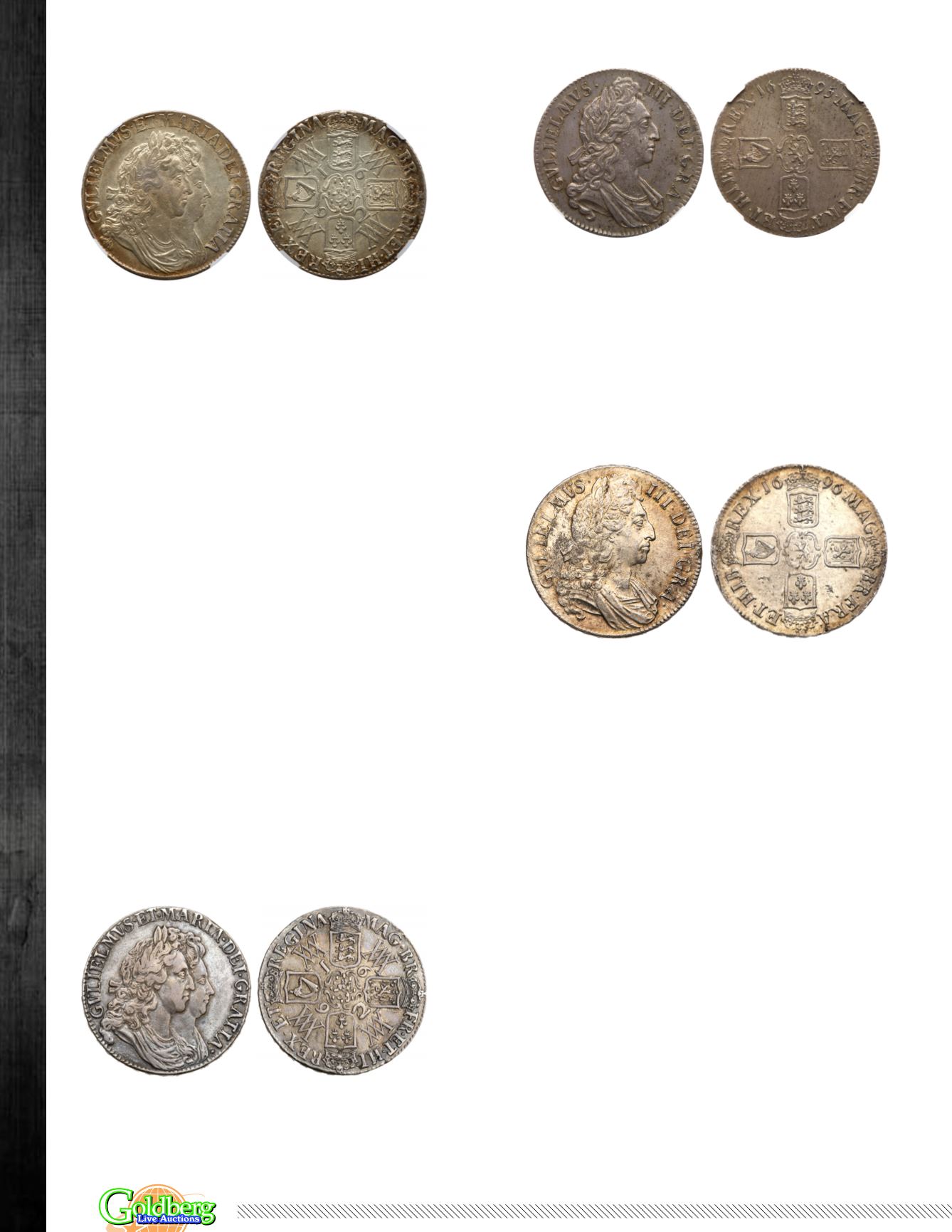

281
|
Session Seven - Wednesday, February 15th 10:00 am PST
C
HOICE
1692 C
ROWN
2930
Great Britain. Crown, 1692
. S.3433; ESC-83; Dav-3780. Wil-
liam and Mary. QVARTO on edge. Obverse, conjoined busts of
monarchs facing right, GVLIELMVS. ET. MARIA. DEI. GRATIA.,
partly toothed border both sides. Reverse; Inverted die axis,
crowned cruciform shields, lion of Nassau at center, date sur-
rounding, WM monogram in each angle. MAG. BR. FR. ET. HI.
REX. ET. REGINA. Probably designed by James Roettier assisted
by his brother Norbert.
This coin is an unusually good specimen for the type, practically
mint state with a golden peripheral tone. Free from adjustment
marks and the weak lettering often evident on these pieces.
Much original mint luster, especially on the reverse.
NGC
graded AU-53.
WINGS APPROVED
.
Estimate Value ................................................ $6,000 - 7,000
* Crowns were not produced until the latter part of this short
reign, and were then minted in relatively small numbers over a
2-year period. The obverse detail was in especially low relief
and William and Mary Crowns are exceptionally rare in
extremely fine or better condition. This is a popular type coin
for several reasons. The conjoined heads of the dual monarchy,
the placement of the date around the four quarters, and the
attractive ' lattice' design achieved by interlinking the W and M
of the royal names, are all unusual. The mintage is low and this
is one of the rarest English large silver coins in top grade.
William and Mary were spouses who began their joint reign in
early 1689. Queen Mary was immensely popular, and was only
32 years old when she contracted smallpox and died in Decem-
ber 1694. Mary was a cheery queen with a social conscience,
but her husband was generally viewed as sullen and egocentric.
The country mourned her passing far more than William' s eight
years later. Among other things Mary strove to improve the
nation' s morals, and instructed magistrates to be more active in
enforcing the vice laws. She supported the establishment of the
Society for the Promotion of Christian Knowledge, which even-
tually took shape in 1698, and she had plans to build a hospital
at Greenwich, which William carried through after her death.
2931
Great Britain. Crown, 1692
. S.3433; ESC-85; Dav-3780. Wil-
liam and Mary, 1688-1694. Edge: QVINTO. Inverted 2. Con-
joined busts right.
Reverse
; Crowned shield of arms. Toned.
NGC graded VF-30.
WINGS APPROVED
.
Estimate Value ......................................................$600 - 800
2932
Great Britain. Crown, 1695
. S.3470; ESC-86; Dav-3781. Wil-
liam III. Obverse, first draped laureate bust of king right.
GVLIELMVS III DEI GRA. Reverse; Crowned cruciform shields,
around lion of Nassau. Edge DECVS ET TVTAMEN ANNO REGNI
SEPTIMO in raised letters. There are none of the (usual) crosses
on the edge, this being the rarer edge variety with cinquefoils.
Attractive uncirculated and well struck with an attractive blue
and gunmetal grey tone over underlying mint bloom. A superbly
detailed specimen with no area of weakness and no defects.
High catalogue value.
NGC graded MS-62.
WINGS
APPROVED
.
Estimate Value ................................................ $2,000 - 2,400
2933
Great Britain. Crown, 1696
. S.3472; ESC-94; Dav-3782. Wil-
liam III. Obverse, third draped laureate bust of king right.
GVLIELMVS III DEI GRA. Reverse; Crowned cruciform shields.
Edge DECVS ET TVTAMEN ANNO REGNI OCTAVO ++ in raised
letters. This uncirculated coin exhibits some of the light flan and
metal flecking typical of the silver coinage of the period, but it is
well struck and glistens with original mint luster under a light
attractive amber tone. The third bust crowns are somewhat
rarer in high grade than the first bust crowns of William III.
NGC graded MS-64.
WINGS APPROVED
.
Estimate Value ................................................ $2,000 - 2,400
* William III was descended from the ancient house of Nassau
in Germany and was the great grandson of William the Silent,
Prince of Orange, who became Stadtholder (or ruler) of the
Netherlands in 1572. His mother, Maria Henrietta, was Charles I'
s daughter, making him James II' s nephew. He would also
marry James' s daughter Mary. After James had become king of
England, William was afraid that James would secure a Catholic
majority in Parliament and he responded to an invitation from 7
English peers who became known as the ' Immortal Seven.' Wil-
liam invaded England in November 1688 and within eight weeks
had succeeded in a bloodless coup. William and Mary occupied
the throne, and the English Parliament determined that by flee-
ing the country James had effectively abdicated. William and his
wife reigned as joint monarchs until her death from smallpox in
1694, and William III continued as sole monarch until his pass-
ing in 1702.
William III Crown pieces were made in just 4 years: 1695,
1696, 1697 and 1700.



















